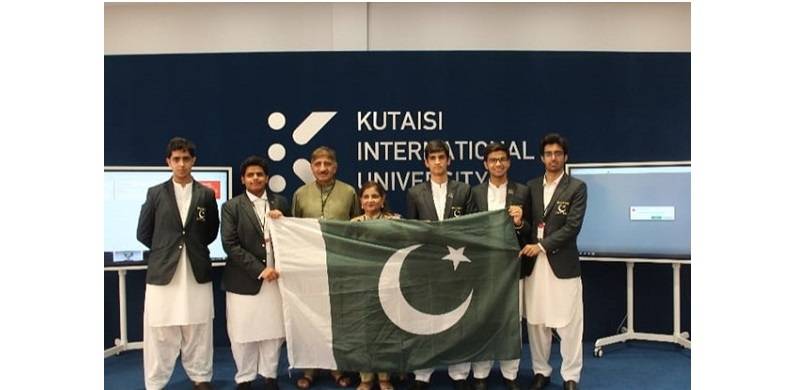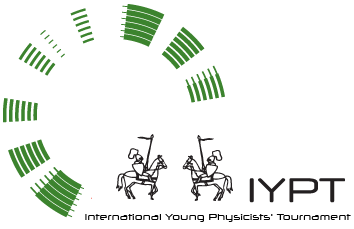
The International Young-Physicists’ Tournament (IYPT) is one of the world’s leading and most influential yearly contests in physics. IYPT is a competition between secondary-school students. It closely resembles a scientific study conducted in the actual world and the process of presenting and defending the findings. IYPT is a team-oriented competition. The competition is an imitation of a scientific conversation rather than a pen-and-paper contest.
The IYPT, sometimes called the "Physics World Cup," aims to spark students' interest and understanding of physics. Participants have approximately one year to work on 17 open-ended problems in the physics of everyday life (which are finalized each year by an international committee). Participants must solve these problems theoretically and empirically and then present and defend their findings. Expert physicists judge the performances of the teams called a jury.
The competition consists of a number of "Physics Fights" rounds. In each round of the contest, teams swap their roles and come to the floor as Reporters, Opponents, and Reviewers, similar to a real-life scientific discourse. The elegance of the competition is that teams can approach the same problem in a variety of ways. All approaches are acceptable as long as they adhere to the problem's wide definition, and teams will be evaluated based on the extent of their investigations.
The idea for the IYPT was first developed in the former Soviet Union. After a similar competition was held there for a while, Evgeny Yunosov introduced the very first international IYPT in 1988. Following the demise of the Soviet Union, the IYPT was also conducted in other European nations, with an ongoing increase in the number of participating nations. The IYPT firstly took place outside of Europe in Brisbane, Australia in 2004.
 The credit for introducing the IYPT to Pakistan goes to Dr. Farida Tahir (COMSATS University, Islamabad). Team Pakistan, led by Dr. Farida Tahir and Tahir Hussain Khan (Chief Coordinator), took part in the 34th IYPT held at Kutaisi International University, Georgia. Since 2016, she has been in charge of preparing young scientific students in Pakistan for the IYPT. Due to her efforts, Pakistan is able to make five consecutive appearances in this research-based tournament. In the first batch, a student, Shahir Niazi, made the country famous internationally by uniquely solving the electric honeycomb problem. This student's paper was published at the age of sixteen, which is his example.
The credit for introducing the IYPT to Pakistan goes to Dr. Farida Tahir (COMSATS University, Islamabad). Team Pakistan, led by Dr. Farida Tahir and Tahir Hussain Khan (Chief Coordinator), took part in the 34th IYPT held at Kutaisi International University, Georgia. Since 2016, she has been in charge of preparing young scientific students in Pakistan for the IYPT. Due to her efforts, Pakistan is able to make five consecutive appearances in this research-based tournament. In the first batch, a student, Shahir Niazi, made the country famous internationally by uniquely solving the electric honeycomb problem. This student's paper was published at the age of sixteen, which is his example.
The whole year efforts were made to select a team in Pakistan to participate at IYPT, under the event called Pakistan Young Physicists’ Tournament (PYPT). In the IYPT, only one team from each nation, made up of five high school students between the ages of 14 and 19, may compete. Regional (provincial level) competitions are held, and after that, there is a national competition (PYPT), and then through this whole process, a national team is selected to represent Pakistan at the international level in IYPT. This year’s national contest (7th PYPT) is going to be held for the battle of the minds on 18th-19th February 2023 at the COMSATS Islamabad, Physics Department. Mark your calendars for the exciting and mind-boggling experience.
Through the enormous efforts of Mr. Tahir Hussain Khan and Dr. Farida Tahir, Pakistan won the bid to host this mega event for the first time in the history of Pakistan in 2023, which is anticipated to bring more than 300 delegates from more than 25 nations. The 36th IYPT will take place in Kohsar University Murree, Pakistan, from the 18th of July (Arrival day) to the 25th of July 2023 (Departure day). The IOC meeting will be held from the 25th to the 27th of July 2023 (Departure day).
This will be an excellent chance for scientific diplomacy, giving overseas participants a chance to learn about Pakistan's enormous scientific ability while also promoting cultural understanding of the country. Students will learn the art of cooperation, scientific dialogue, accepting faults and scientific oversights, eloquence, and many other skills in addition to addressing research challenges. The overall aim is to foster the development of the next generation of researchers in the field of physics and to foster international collaboration and the exchange of ideas.
Although the PYPT journey is still in its initial stages, Dr. Farida Tahir aims to prepare Pakistani students to do research at a level which might one day be worthy of the Nobel Prize - through this platform. She expressed her hope that public institutions, elected leaders, and citizens of our nation would recognize the significance of such international gatherings and step forward to support positive initiatives that foster talent in the fundamental sciences and promote science.
The crux of all these efforts lies in the intention of playing our part in the development of a scientifically-literate nation. Let’s play our role in our kids’ learning environment and bright scientific future by making this mega event super successful!
The IYPT, sometimes called the "Physics World Cup," aims to spark students' interest and understanding of physics. Participants have approximately one year to work on 17 open-ended problems in the physics of everyday life (which are finalized each year by an international committee). Participants must solve these problems theoretically and empirically and then present and defend their findings. Expert physicists judge the performances of the teams called a jury.
The competition consists of a number of "Physics Fights" rounds. In each round of the contest, teams swap their roles and come to the floor as Reporters, Opponents, and Reviewers, similar to a real-life scientific discourse. The elegance of the competition is that teams can approach the same problem in a variety of ways. All approaches are acceptable as long as they adhere to the problem's wide definition, and teams will be evaluated based on the extent of their investigations.
The idea for the IYPT was first developed in the former Soviet Union. After a similar competition was held there for a while, Evgeny Yunosov introduced the very first international IYPT in 1988. Following the demise of the Soviet Union, the IYPT was also conducted in other European nations, with an ongoing increase in the number of participating nations. The IYPT firstly took place outside of Europe in Brisbane, Australia in 2004.
 The credit for introducing the IYPT to Pakistan goes to Dr. Farida Tahir (COMSATS University, Islamabad). Team Pakistan, led by Dr. Farida Tahir and Tahir Hussain Khan (Chief Coordinator), took part in the 34th IYPT held at Kutaisi International University, Georgia. Since 2016, she has been in charge of preparing young scientific students in Pakistan for the IYPT. Due to her efforts, Pakistan is able to make five consecutive appearances in this research-based tournament. In the first batch, a student, Shahir Niazi, made the country famous internationally by uniquely solving the electric honeycomb problem. This student's paper was published at the age of sixteen, which is his example.
The credit for introducing the IYPT to Pakistan goes to Dr. Farida Tahir (COMSATS University, Islamabad). Team Pakistan, led by Dr. Farida Tahir and Tahir Hussain Khan (Chief Coordinator), took part in the 34th IYPT held at Kutaisi International University, Georgia. Since 2016, she has been in charge of preparing young scientific students in Pakistan for the IYPT. Due to her efforts, Pakistan is able to make five consecutive appearances in this research-based tournament. In the first batch, a student, Shahir Niazi, made the country famous internationally by uniquely solving the electric honeycomb problem. This student's paper was published at the age of sixteen, which is his example.The whole year efforts were made to select a team in Pakistan to participate at IYPT, under the event called Pakistan Young Physicists’ Tournament (PYPT). In the IYPT, only one team from each nation, made up of five high school students between the ages of 14 and 19, may compete. Regional (provincial level) competitions are held, and after that, there is a national competition (PYPT), and then through this whole process, a national team is selected to represent Pakistan at the international level in IYPT. This year’s national contest (7th PYPT) is going to be held for the battle of the minds on 18th-19th February 2023 at the COMSATS Islamabad, Physics Department. Mark your calendars for the exciting and mind-boggling experience.
Through the enormous efforts of Mr. Tahir Hussain Khan and Dr. Farida Tahir, Pakistan won the bid to host this mega event for the first time in the history of Pakistan in 2023, which is anticipated to bring more than 300 delegates from more than 25 nations. The 36th IYPT will take place in Kohsar University Murree, Pakistan, from the 18th of July (Arrival day) to the 25th of July 2023 (Departure day). The IOC meeting will be held from the 25th to the 27th of July 2023 (Departure day).
This will be an excellent chance for scientific diplomacy, giving overseas participants a chance to learn about Pakistan's enormous scientific ability while also promoting cultural understanding of the country. Students will learn the art of cooperation, scientific dialogue, accepting faults and scientific oversights, eloquence, and many other skills in addition to addressing research challenges. The overall aim is to foster the development of the next generation of researchers in the field of physics and to foster international collaboration and the exchange of ideas.
Although the PYPT journey is still in its initial stages, Dr. Farida Tahir aims to prepare Pakistani students to do research at a level which might one day be worthy of the Nobel Prize - through this platform. She expressed her hope that public institutions, elected leaders, and citizens of our nation would recognize the significance of such international gatherings and step forward to support positive initiatives that foster talent in the fundamental sciences and promote science.
The crux of all these efforts lies in the intention of playing our part in the development of a scientifically-literate nation. Let’s play our role in our kids’ learning environment and bright scientific future by making this mega event super successful!

